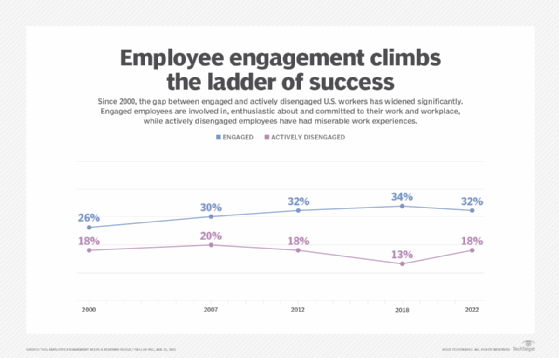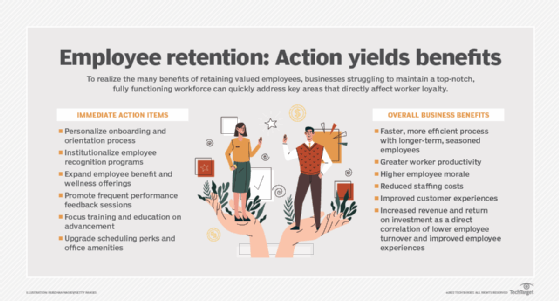director of employee engagement
What is a director of employee engagement?
Director of employee engagement is one of the job titles for a human resources (HR) manager who is responsible for an organization's employee engagement strategy. Healthy engagement levels have been linked to turnover reduction and increased productivity, which has resulted in rising interest in employee engagement efforts.
A director of engagement, or engagement manager, is responsible for developing strategies to improve engagement. They might manage programs designed to foster it, such as employee recognition programs, wellness programs and other activities aimed at creating a positive workplace environment. An engagement manager might also be responsible for internal employee communications and shaping corporate culture.
Having a dedicated engagement manager is a recent change for many organizations, associated with other shifts in the way employee engagement is measured. For many years, engagement was primarily measured using annual surveys, usually comprising 100 questions and analyzed by outside consultants. Organizations that replace annual surveys often turn to more frequent employee pulse surveys and other methods for measuring engagement.

Why is a director of employee engagement important?
The role of a director of employee engagement can be essential in shaping an organization's work environment and culture. This position influences organizational success in the following ways:
- Work satisfaction. Employee engagement serves as a key barometer for work satisfaction. Employees who are engaged are committed and enthusiastic about their roles and feel a strong sense of belonging within the company. According to Deloitte's "2020 Global Human Capital Trends" survey, 79% of respondents emphasized employee engagement's importance to organizational success over the next 12 to 18 months.
- Positive work environment. A director of employee engagement helps cultivate a workplace where employees feel valued and acknowledged. This enhances well-being and bolsters employee morale, contributing to a more productive and harmonious work environment.
- Talent retention. Engaged employees are less likely to seek opportunities outside the company, which reduces recruitment costs and preserves institutional knowledge. A director of employee engagement plays a crucial role in this talent retention and talent management by implementing strategies that enhance employee satisfaction.
- Increased productivity. Engaged employees who stay with their company perform at higher levels, driving the organization toward its strategic goals.

Employee engagement director's roles and responsibilities
Engagement managers are usually experienced HR professionals who can take on a range of roles and responsibilities, such as the following:
- Talent acquisition. An engagement manager often plays a key role in talent acquisition, recruiting and onboarding. Engagement analysis data is often used to inform recruiting; the behaviors of highly engaged, productive workers can help identify ideal job candidates.
- Building relationships. Directors of employee engagement foster positive interactions between staff and management, ensuring the organization's policies are effectively communicated and understood.
- Cultural development. Engagement managers are responsible for promoting and integrating diversity, equity and inclusion (DEI) into the company culture and work-life balance programs. They serve as a crucial point of contact for addressing employee grievances and concerns.
- Strategic engagement planning. These directors use employee engagement surveys and metrics to develop and implement strategic plans aimed at boosting internal communication as well as overall productivity and performance management.
- Program management. Directors oversee programs related to employee recognition, well-being and wellness, which are essential for maintaining a positive workplace culture and retaining talent.
- Feedback incorporation. Engagement directors use employee feedback to refine and improve the company's culture and operational strategies.
Skills and qualifications of an engagement manager
The director of employee engagement job description requires a set of skills and qualifications similar to other HR career paths.
Essential skills and expertise
The skills successful employee engagement managers have include the following:
- Interpersonal and communication skills. The ability to present ideas clearly and persuasively is crucial, often using tools such as Microsoft PowerPoint and other presentation software.
- Analytical skills. A key responsibility is analyzing employee engagement surveys and people data to develop strategic engagement plans and programs. This role requires strong analytical abilities to interpret complex data effectively.
- Leadership and project management. Engagement managers must be comfortable with leadership roles and the ability to manage multiple projects efficiently. This includes driving employee engagement initiatives and coordinating with various stakeholders to ensure successful implementation.
- Problem-solving skills. The ability to identify issues within the work environment and develop actionable solutions is critical. This role involves strategic planning and the execution of engagement strategies to enhance workplace culture.
- Knowledge of industry best practices. Staying updated with the latest trends in employee experience, employee engagement and organizational culture is essential. This knowledge helps in crafting effective engagement strategies that align with industry standards.
- Technical proficiency. Increasingly, the role requires familiarity with HR analytics and technology to enhance engagement metrics and develop effective action plans.
- Adaptability and teamwork. Individuals in this role must be able to work under pressure, prioritize tasks and adapt to changing organizational needs while maintaining strong working relationships with various team members.
Required education and experience
Directors of employee engagement usually have the following educational and work experience background:
- Education. A bachelor's degree in HR, sociology, psychology or a related field is required. A master's degree is often preferred for senior management roles.
- Professional experience. Related experience in HR, employee relations or a similar field is generally required. Experience in handling DEI initiatives is also valued.
Salary and outlook
A director of employee engagement's average salary in the United States is approximately $116,000 annually, according to Glassdoor. However, when considering additional compensation such as bonuses, the median total pay can rise to around $166,000 per year.
Trends in engagement management
The demand for professionals in employee engagement roles is expected to grow. This growth is fueled by the increasing importance of employee engagement in maintaining a productive, innovative and satisfied workforce.
Engagement management is increasing in complexity, thanks in part to HR's growing use of analytics and other technology. Engagement surveys are just one measure. Some organizations have begun to track employee movement with employee monitoring systems. They can identify if workers arrive late for work, leave early or start to take longer breaks, all of which could be signs of declining engagement.
Some companies are also scraping Microsoft Outlook calendars to see how engaged employees are with their fellow workers. Employees who tend to isolate themselves might be less engaged. Email is also starting to be monitored for similar engagement clues.
Some companies examine employee behavior on social media sites. Employees who update LinkedIn profiles, for instance, could be signaling interest in changing jobs. The director of engagement management might be tasked with using these metrics to identify staffing risks and develop ways to mitigate them.
Employee engagement is key to retaining talent and cultivating a successful workplace. Read our guide on how to build an effective employee experience strategy.







